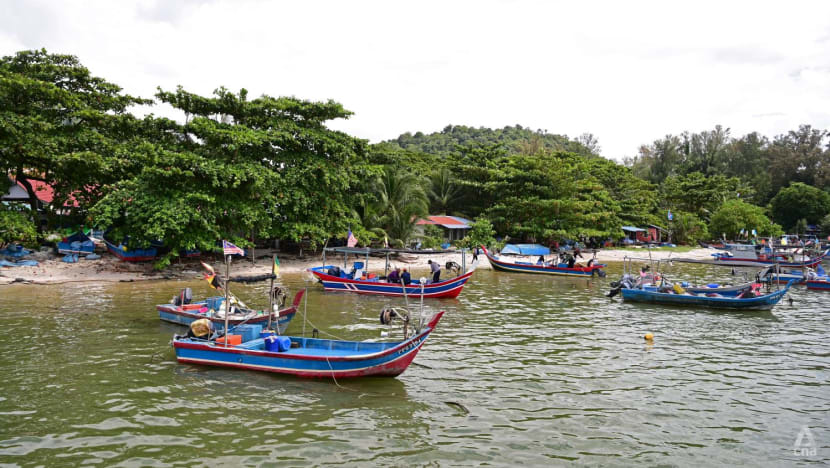Penang fishermen’s livelihoods, identity politics among concerns as state election looms
The number of fishermen affected by a reclamation project is said to be around 100.

Fishing vessels rest in the bay of Kampung Sungei Batu. (Photo: CNA/Gaya Chandramohan)
GEORGETOWN: Various concerns are on the minds of voters in Penang ahead of the upcoming state election on Saturday (Aug 12). While the top worry for most is the rising costs of living, another issue that weighs heavily on some is a controversial reclamation project.
In a fishing village near the southern tip of Penang Island, fishermen are upset about the project that involves creating a man-made island to drive economic and urban development.
Known as Penang South Islands (PSI), the multi-billion ringgit project is a brainchild of Penang’s state government led by the Democratic Action Party (DAP). The PSI project’s initial aim was to create three man-made islands measuring 1,821 ha near the southern tip of Penang Island to drive economic and urban development.
The project was estimated to take 30 to 50 years to complete and provide affordable housing, public beaches and parks. It was envisioned to be a game changer for the region, aiming to transform Penang and address key challenges faced by the state, such as inadequate infrastructure for its growing population, traffic congestion and lack of jobs.
PROJECT SCALED DOWN
However, the state government has scaled down the project from an initial three islands to just one.
In May, Penang caretaker chief minister Chow Kon Yeow said the state government has taken the approach to reduce the size of the project from 4,500 acres to 2,300 acres.
This comes amid fishermen’s fears that the project will destroy the rich marine biodiversity and affect the livelihoods of communities that rely on the waters. About 6,000 fishermen raised objections recently, while politicians are busy campaigning.
With the scaled down project, the number of fishermen affected is said to be around 100, as opposed to 500 previously.
However, Mr Zakaria Ismail from the Penang Fishermen Association, is taking the number with a pinch of salt.
"Actually, the figure of 140 who are affected is only on paper. Whoever made that statement can come here and fish with the fishermen. In reality, all of the people of Penang are affected. Imagine, this is the only area we can fish in all of Penang state,” the deputy chairman of the association told CNA.

Mr Chow said his government will leave no fisherman behind.
“I'm sure when the project commences, even all those who are objecting to the project are eligible for the social impact mitigation programme incentive. For affected fishermen in that area, we have offered them new boats with new engines and also job opportunities, and also sending them for training to get the seaman’s license and with that they can do more fishing and with a bigger capacity boat they can go further,” he said.
IDENTITY POLITICS, RISE OF PAS
Mr Amir Fareed, director of strategy at ASEAN-focused public affairs and political risk consultancy KRA Group, said another issue that could raise political temperatures is identity politics.
“Identity politics is still relevant in Malaysian politics today, even in 2023,” he said.
“It is still prevalent because you have race-based parties and religious-based parties contesting,” he added.
Recently, Prime Minister Anwar Ibrahim issued a final warning to all parties not to exploit issues touching on race, religion and the royal institution which can divide the country.
There are also concerns among voters about Islamic party Parti Islam Se-Malaysia (PAS), which emerged as the single biggest party in Parliament, after Malaysia’s General Election last November.
Some are afraid that their thinking is too “restrictive”, while others are afraid that the line between religion and politics will be blurred.
“I am concerned if politics is mixed with religion because politics is politics, religion is religion. It is best not to mix those two,” said one voter.
Altogether, 245 state seats in Selangor, Negeri Sembilan, Kedah, Kelantan, Terengganu and Penang will be contested in the Aug 12 polls. The six states are holding elections separately from Malaysia's General Election as they decided not to dissolve their respective state assemblies back then.
While the results of the state elections will not have a direct impact on Mr Anwar’s unity government, they will reflect voters’ support for him at the national level. Regionally, a stable Malaysia will allow the country to navigate more steadily amid an increasingly challenging and unpredictable geopolitical landscape.



















